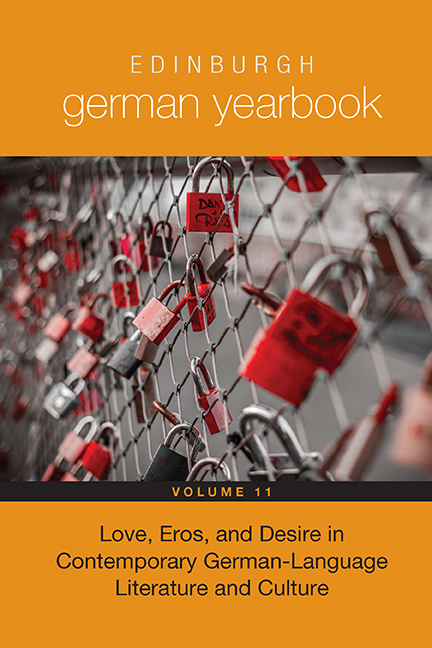 Edinburgh German Yearbook 11
Edinburgh German Yearbook 11 Book contents
- Frontmatter
- Contents
- Introduction: Love, Literature, (Post-)Modernity: On the Re-Emergence of Love in Contemporary German Literature
- Revisions of Romantic/Literary Traditions
- Variations on Love in the Contemporary
- Healthy Socialists and Kinky Heroes: Carnivalesque Deconstruction of Heteronormativity in Thomas Brussig's Helden wie wir
- Disembodied Love and Desire: Virtual Love in Daniel Glattauer's Gut gegen Nordwind
- Thomas Mann in Furs: Remediations of Sadomasochism in Maxim Biller's Im Kopf von Bruno Schulz and Harlem Holocaust
- Love and Cultures of Exclusion
- Notes on the Contributors
Disembodied Love and Desire: Virtual Love in Daniel Glattauer's Gut gegen Nordwind
from Variations on Love in the Contemporary
Published online by Cambridge University Press: 21 August 2019
- Frontmatter
- Contents
- Introduction: Love, Literature, (Post-)Modernity: On the Re-Emergence of Love in Contemporary German Literature
- Revisions of Romantic/Literary Traditions
- Variations on Love in the Contemporary
- Healthy Socialists and Kinky Heroes: Carnivalesque Deconstruction of Heteronormativity in Thomas Brussig's Helden wie wir
- Disembodied Love and Desire: Virtual Love in Daniel Glattauer's Gut gegen Nordwind
- Thomas Mann in Furs: Remediations of Sadomasochism in Maxim Biller's Im Kopf von Bruno Schulz and Harlem Holocaust
- Love and Cultures of Exclusion
- Notes on the Contributors
Summary
EPISTOLARY NOVELS BECAME increasingly popular in the eighteenth century as a consequence of two major developments: the emergence of the concept of romantic love1 and the formation of modern reflexivity. Epistolary novels like Richardson's Pamela (1740), Rousseau's Julie ou la Nouvelle Heloïse (Julie, Or The New Heloise, 1761), or Goethe's Die Leiden des jungen Werthers (The Sorrows of Young Werther, 1774) explore the potential of this genre to express modern subjectivity in the context of romantic love as a medium with its own codes of communication. As a traditional genre of self-observation and observation of others, epistolary novels simulate face-to-face communication and are particularly suited to replicate modern forms of sociability and reflection. In the twenty-first century, even after the decline of letters as a preferred medium of communication, the genre is far from disappearing; with the development of the e-mail novel, it has transformed and accommodated itself to contemporary conditions.
This chapter explores the creation of intimacy and expression of love and desire in a twenty-first-century epistolary novel. Austrian writer Daniel Glattauer's Gut gegen Nordwind (translated as Love Virtually, 2006) revives and updates the genre of the epistolary novel by using e-mails as the medium of communication. Gut gegen Nordwind was a major success in Austria, as well as internationally, and was translated into twenty-eight languages. The novel is composed exclusively of e-mails exchanged between the protagonists Leo Leike and Emmi Rothner. An accidental conversation caused by a typographical error in an e-mail address soon turns into a contemporary romance, a virtual love story, as the English title anticipates. The novel tells the story of a fictionalized cyber-romance that mirrors literature's response to new information technologies. This chapter will study the narrative implications of the choice of a hybrid genre such as the e-mail novel. It will explore the possibilities and limits of the disembodied communication situation in the novel, and it will ask how the digital space shapes virtual desire and love.
Convergence of Media and Its Consequences
The novel itself classifies its genre as an “E-Mail-Roman” (GgN, 126), thus establishing a link to the tradition and genre of the epistolary novel. Readers are intended to establish a link between the genre of the epistolary novel and Glattauer's work, a process inherent in the reading process, as Dupont points out.
- Type
- Chapter
- Information
- Edinburgh German Yearbook 11Love, Eros, and Desire in Contemporary German-Language Literature and Culture, pp. 93 - 112Publisher: Boydell & BrewerPrint publication year: 2017


